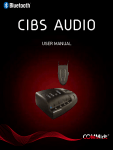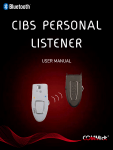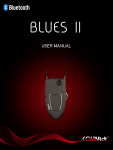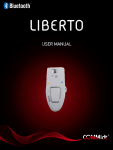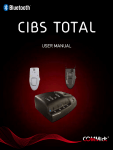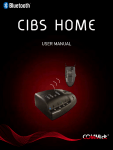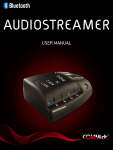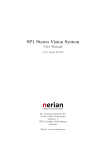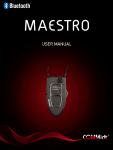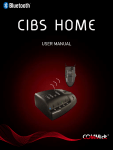Download MAESTRO
Transcript
® MAESTRO User manual 5 4 11 6 7 3 2 8 1 12 9 10 1 MAESTRO 2 NO EN F D NL ES SE DK SU English Congratulations About the Maestro The functions of the Maestro Charging the Maestro Switching Maestro on and off Pairing the Maestro with other devices How to... ……adjust the volume ……answer a telephone call ……end a telephone call ……make a call ……use voice-dialling ……switch between programmes on the Maestro ……controlling programme state ……using the speed-dial ……listening to audio devices ……using the conversation amplifier ……programming the Maestro Description of light diodes and colours Factory default settings Trouble shooting and FAQ Storage and maintenance Certification and safety approvals (english) Declaration of conformity (english) 3 4 4 6 6 7 7 8 8 9 9 9 9 9 9 9 10 10 11 11 12 12 13 B C User manual Maestro (NO_EN_F_D_NL_ES_SE_DK_SU) 1t NO Congratulations Congratulations on your new Maestro. We hope you get a lot of pleasure from this solution which will deliver great sound from your mobile phone, TV/Radio and provides better sound in conversations and at meetings with several participants. This user manual will ensure you get started, so that you get the most pleasure from your new solution. Your local dealer offers a range of accessories which will further enhance the functionality of this product. Before use, the unit must be fully charged (see page 6 for instructions). Charge time is approximately 2 hours. Beware! Together with the connected headset/earbuds, the T-loop (Maestro) can emit sound at a high volume. Exposure to this may cause permanent hearing damage. Be careful when increasing the volume to avoid such injuries. EN F D NL ES SE DK SU Be careful when using the device while engaged in activities which demand your full attention. Never attempt to dismantle the product yourself. Only approved local dealers or service centres may open the product. Contact your local dealer if any parts of the unit need replacing. Keep out of reach of children: The plastic packaging of the product and accessories are not children’s toys. The packaging or the small parts it contains may cause choking if swallowed. Ignition of flammable atmospheres Do not use the Maestro in environments where there is a danger of igniting flammable gasses. About the Maestro The Maestro is a T-loop which receives sound from all types of Bluetooth devices (mobile phones, TV, MP3 players, etc.) When using the Audiostreamer (accessory) you can also receive sound from TV/Radios, etc, which do not have Bluetooth. Liberto/Allegro (accessory) are wireless microphones which also communicate with the Maestro. User manual Maestro (NO_EN_F_D_NL_ES_SE_DK_SU) 1t 4 NO EN See the illustrations on page 1 for an explanation of the points below F • Answer button 1 : Used to answer incoming phone calls. D • Socket for charging and accessories 2 : The power supply cable (accessory) is connected here, as well as other accessories with 2.5mm jacks. • Programme indicator (lamps) 3 : Shows which programme the Maestro is on. See the table on page 11 for an explanation of the light signals. SE • USB socket 4 : For charging the unit via USB cable connection to a computer. DK • Headset socket 5 : For connecting the accompanying earbuds with microphone, standard headsets (accessories) and headsets with microphone (accessories). Used when you are not using a hearing aid. • Microphone • Battery indicator lamp 7 : Shows the battery level of the Maestro. See the table on page 12 for an explanation of the light signals. • Programme selector 8 : Switches between the different programmes. • On/Off button 9 : Switches device on and off. • Volume button 10 : Push upwards for higher volume and downward for lower volume. • Pairing button 11 : Sets the Maestro to pairing mode. This happens the first time you establish a connection between the devices. • Speed-Dial button 12 : Calls a pre-programmed number from a paired mobile phone. The numbers are easily programmed via a computer with internet access and standard Bluetooth connection. NL ES SU 6 No sound can be heard from the Maestro unless you use the hearing aid/CI in the T or MT setting, the neck loop is around the neck, or you are using the earbuds/headset. 5 User manual Maestro (NO_EN_F_D_NL_ES_SE_DK_SU) 1t NO The functions of the Maestro The Maestro has three main functions: EN F 1. Amplifier for TV/Radio, etc. (TV/RADIO): Sends wireless audio from TV/Radio, etc via the Audiostreamer to the Maestro. You can choose between 4 different audio sources on the Audiostreamer. You can also receive an alert from your alerting system if it has an audio outlet and is connected to the Audiostreamer. The alert is given highest priority and will overrule all other audio sources and telephone conversations. To connect audio devices without Bluetooth, you must use COMMidt’s audio cable (accessory, article no: 908-001) to receive sound on the Maestro. NL NOTE: You will not receive an alert as long as your Maestro has an active audio connection to a Liberto or Allegro. DK 2. Conversation amplifier (CONVERSATION) In situations where you feel the sound from the hearing aid/CI is too weak or there is too much noise, use one of the wireless Liberto/Allegro microphones (accessories) or a cabled microphone (accessory, these are connected to the socket 2 ). The microphone must be placed close to the sound source to achieve the best sound quality. The Liberto (accessory) can also be used as a directional microphone. Just point it at what you want to hear. D ES SE SU 3. Amplifier for the telephone (TELEPHONE) Communicates with mobile/wireless telephones with Bluetooth. For telephones without Bluetooth, use the Tango VII (accessory) for wireless communication between telephones and Maestro. Charging the Maestro Make sure the Maestro is fully charged before you use it. You can charge the Maestro in the following ways: • By cable from the wall outlet • Directly from a computer by USB cable • Through the Audiostreamer (accessory) • Through the Twin Charger Cradle (accessory) • With the Car Charger (accessory) User manual Maestro (NO_EN_F_D_NL_ES_SE_DK_SU) 1t 6 NO EN F D NL ES SE DK SU During charging, the Battery indicator lamp 7 will flash red. When the Maestro is fully charged the Battery indicator lamp 7 will shine a solid blue. When the battery is low the Battery indicator lamp 7 will blink red and you will hear an sound signal from the Maestro. NOTE: The lifetime of the battery will be significantly reduced if the device is left uncharged for long periods. We advise you to charge the device at least once a month. When the operation time of the battery begins to decrease and you wish to replace it, please send it to your local dealer. The article number of the battery is: 956-001 Switching Maestro on and off How to switch on the Maestro: • Keep the ON/Off button 9 pressed until you see the Battery indicator lamp 7 turn blue. At the same time you should hear a signal via the T-Loop or via the headset connected to the Maestro. • Note: The first time you switch on your Maestro, it will automatically turn into pair mode. The Battery indicator light 6 then flashes alternately red and blue. Go to chapter Pairing the Maestro with other devices and skip step 1 to finish the pairing. How to switch off the Maestro: • Keep the ON/Off button 9 pressed until you see the Battery indicator lamp 7 turn blue. At the same time you should hear a signal via the T-Loop or via the headset connected to the Maestro. Pairing the Maestro with other devices The devices must be programmed to communicate with each other and other Bluetooth devices, e.g. a mobile phone. This is done by connecting them wirelessly (pairing). NOTE: It is important that the Maestro and the Bluetooth devices is paired with are within one meter of one another during pairing and that the units to be paired are fully charged. 1. 7 • • How to set the the Maestro to pairing mode: Switch on the Maestro Press and hold the pairing button 11 until you see the Battery indicator lamp 7 flash alternately red and blue. You should also hear a double tone. The Maestro is now ready to pair for approximately 3 minutes. User manual Maestro (NO_EN_F_D_NL_ES_SE_DK_SU) 1t NO 2. • How to configure the mobile phone so that it detects the Maestro: Follow the mobile phone’s user manual. Usually this involves finding the setup, connection or the Bluetooth menu on the mobile phone and choosing DISCOVER or ADD a Bluetooth device. See an example of a typical mobile phone below. Fig. Fig. Fig. Fig. 66666 Fig. Fig. 6 Connectivity Push to talk Infrared Bluetooth Modem Synchronization Data cable Select Back 3. • • • Fig. 6 Devices found Maestro Fig. 6 0000 0000 0000 Fig. 6 0000 0000 0000 Maestro Passcode: Cancel Ok Devices found Maestro Maestro Paired. The handsfree is now ready for use **** Select 0000 Cancel Ok The mobile phone finds Maestro! The mobile phone asks if you wish to connect to it. Accept by pressing Yes or OK on the mobile phone and confirm with the pin code, which is 0000 (4 zeros). The mobile phone will confirm if the pairing has been successful. If the pairing is unsuccessful, repeat this procedure. EN F D NL ES SE DK SU If you wish to pair the the Maestro with a Bluetooth product without a display, the product must be set to pairing mode and use password 0000 so that the pairing can be performed. The Maestro can be paired to a maximum of 8 devices. If you try to pair a ninth device, the device that is the longest un-used will be removed from the Maestro. Use the list on page A to keep an overview of what is paired with the Maestro. How to... …… adjust the volume • The volume can be gradually increased (press once for each volume level) or by pressing the volume button 10 in the desired direction until the desired volume level has been reached. • You will hear a signal when the volume has reached the lowest or highest level. • The Maestro remembers its last volume position, so that when switched off and on it will start at the same volume position. User manual Maestro (NO_EN_F_D_NL_ES_SE_DK_SU) 1t 8 NO EN …… answer a telephone call • Press the answer button 1 to answer a telephone call. F …… end a telephone call • Press the answer button 1 to end a telephone call. D NL ES SE DK SU …… make a call • When you call from your mobile phone, the telephone call (depending on the setup of the phone) is automatically transferred to the Maestro. If this function is not available on your phone, press the answer button 1 once to transfer the telephone call to the Maestro. …… use voice-dialling • This function is dependant on the mobile phone supporting this function. See the mobile phone’s user manual for more information. • Press the answer button 1 once. Speak the pre-recorded voice tag into the microphone 6 . • You will achieve best results if you record the voice tag signal via the Maestro. • See the operating instructions of the phone if you need more • information on this function. …… switch between programmes on the Maestro • Press the programme button 8 to switch between programmes. • Wait a few seconds between programme changes. • The programmes are changed in this order: -- TV/Radio -- Conversation (Conversation amplifier) -- Telephone …… controlling programme state • Press the volume button on the Maestro 10 upwards once. • The Maestro will indicate which programme it is on by lighting the programme indicator 3 for approximately 3 seconds. …… using the speed-dial • NOTE: For this function to work, the phone must be within range of the Maestro. • The Maestro must be programmed before using this function. See the section: Programming the Maestro on page 11. • Press and hold the Speed-Dial button 12 until you hear a tone. The phone will then call the pre-programmed number. • When the phone call is ended, the Maestro will return to the programme it was on before the phone call was made. 9 User manual Maestro (NO_EN_F_D_NL_ES_SE_DK_SU) 1t NO …… listening to audio devices • Audio devices with inbuilt Bluetooth. -- The Maestro must be paired with a mobile phone with an A2DP profile before you continue (see page 7 for instructions). -- Set the Maestro to the TV/Radio programme (see page 9 for instructions). • Audio devices without Bluetooth (wireless via Liberto/Allegro). -- You must use the Liberto/Allegro (accessory) together with an audio cable (article no: 908-001, accessory). -- See the operating instructions of the Liberto/Allegro for instructions. • Audio devices without Bluetooth (with cable). -- Use audio cable (accessory, article no: 908-001). -- Connect the smallest plug (2.5mm jack) to the socket 2 . -- Connect the largest plug (3.5mm jack) to the audio device. -- All Bluetooth microphones (Allegro/Liberto) must be switched off. -- Set the Maestro to the Conversation programme (see page 9 for instructions). • Close the audio connection between the Audiostreamer and the Maestro. -- Change the programme on the Maestro (see page 9 for instructions), or switch off the Maestro (see page 7 for instructions). • Audio devices connected to the Audiostreamer (accessory). -- See the operating instructions for the Audiostreamer. EN F D NL ES SE DK SU …… using the conversation amplifier • Listening via the integrated microphone 6 -- All Bluetooth microphones (Allegro/Liberto) must be switched off. -- Set the Maestro to Conversation programme (see page 9 for instructions). • Listening via an external microphone -- Connect an external microphone (accessory) to the socket for charging and accessories 2 . -- All Bluetooth microphones (Allegro/Liberto) must be switched off. -- Set the Maestro to Conversation programme (see page 9 for instructions). • Listening via wireless microphones (accessory, Allegro/Liberto) -- The Maestro must be paired to a wireless microphone Liberto/ Allegro) before you continue. See the operating instructions of the Liberto/Allegro for instructions. User manual Maestro (NO_EN_F_D_NL_ES_SE_DK_SU) 1t 10 NO EN F D NL ES SE DK SU -- The Liberto/Allegro must be switched on. -- Set the Maestro to Conversation programme (see page 9 for instructions). -- The Maestro will search for and connect to the Liberto/Allegro …… programming the Maestro • Go to www.commidt.com to download both the operating instructions and the programme: CIBS Interface. • The CIBS Interface programme offers the following options: -- Set up Speed-Dial number -- Turn on and off monitoring voice (enables you to hear your own voice) -- Locate the serial number Useful tips: Using the accompanying rotating shirt/blouse clip can reduce noise caused by the device rubbing off clothing. Attach the clip to the back of the Maestro/Liberto. Description of light diodes and colours Programme indicator lamps 3 11 What you see What this implies for the Maestro Solid green light Connected device with a Bluetooth A2DP profile, e.g. Audiostreamer, TV with Bluetooth, etc. Flashing green light Searching for a paired device with a Bluetooth A2DP profile, e.g. Audiostreamer Solid blue light A connected wireless microphone (Allegro / Liberto) or an integrated conversation amplifier is activated Flashing blue light Searching for Allegro/Liberto (accessory) Solid yellow light Connected device with a Bluetooth handsfree profile, e.g. mobile phone, Tango VII, etc. Flashing yellow light Searching for a paired device with a Bluetooth handsfree profile, e.g. mobile phone User manual Maestro (NO_EN_F_D_NL_ES_SE_DK_SU) 1t NO Battery indicator lamp 7 What you see What this implies for the Maestro Solid blue light The battery level is between 100% - 20% Flashing red light The battery level is below 20% Solid blue light (while charging) Charging complete Flashing red light (while charging) The Maestro is charging Alternate blue and red light The Maestro is ready for pairing • F D NL ES SE Factory default settings • • • EN DK SU This function deletes all pairings on the Maestro. Any settings made after you received the device will also be deleted. Press and hold the pairing button. First you will hear a double tone which indicates the device is set to pairing mode. You must keep the button pressed until you hear the second double tone. Switch off the Maestro. When you switch the device on again, it will automatically go into pairing mode (the battery indicator lamp will flash alternately red and blue). This indicates that the device has been reset to the factory default settings. Trouble shooting and FAQ The Maestro will not switch on! • Charge the battery The Maestro will not charge! • Make sure the power supply is correctly connected to the Maestro and that the plug is working. I hear crackling! • For best sound quality, the Maestro must be within range of the mobile phone, Liberto/Allegro or Audiostreamer. • If you are using the earbuds, make sure the plug to the earbuds is correctly connected. User manual Maestro (NO_EN_F_D_NL_ES_SE_DK_SU) 1t 12 NO EN F D NL ES SE DK SU I cannot hear anything from the Maestro! • Increase the volume of the Maestro. • Check that the Maestro is paired to the mobile phone/Audiostreamer/ Liberto/Allegro or another Bluetooth device. • If you are using the headset, make sure the plug to the headset is correctly connected. • If you are using the hearing aid, make sure the loop is placed correctly around the neck and that the hearing aid is set to T or MT. I have connection problems! • You may have deleted the pairing with the mobile phone. Follow the instructions for pairing on page 7. Will the Maestro work with other Bluetooth devices? • The devices are made to work with all Bluetooth devices. This depends on the Bluetooth devices being compatible with Bluetooth version 1.1, 1.2 or 2.0, support headsets and have a handsfree and/or A2DP profile. • The Bluetooth devices must have “0000” as password. I cannot use voice-dialling! • These functions are accessible if the telephone supports them. See the telephone’s user manual for more information. Storage and maintenance • • • • 13 Always store the Maestro in a safe place with the power switched off. Do not store the Maestro in extreme temperatures (over 45°C/113°F, in direct sunlight, or below -10°C/14°F). This can reduce the lifetime of the battery and affect performance. High temperatures can also reduce performance. Do not expose the Maestro to rain or other liquids. Clean the device with a dry cloth. User manual Maestro (NO_EN_F_D_NL_ES_SE_DK_SU) 1t NO EN F D List over paired units to the Maestro 1. ________________________________ NL 2. ________________________________ ES 3. ________________________________ SE DK SU 4. ________________________________ 5. ________________________________ 6. ________________________________ 7. ________________________________ 8. ________________________________ A User manual Maestro (NO_EN_F_D_NL_ES_SE_DK_SU) 1t NO Certification and safety approvals CE This product is CE marked accordingly to the provisions of the R & TTE Directive (99/55/EC), COMMidt AS, declares that this product is in compliance with the essential requirements and other relevant provisions of Directive 1995/5/EC. For further information, please consult: http://www.commidt.com Bluetooth The Bluetooth word® and logos are owned by the Bluetooth SIG, Inc. and any use of such marks by COMMidt AS is under licence. Other trademarks and trade names are those of their respective owners. Electrical and electronic equipment (EEE) contains materials, components and substances which can be dangerous and detrimental to human health and the environment if waste electrical and electronic equipment (WEEE) is not disposed of correctly. Products marked with the “crossed-out waste bin” symbol shown below are electrical and electronic equipment. This symbol indicates that waste electrical and electronic equipment must not be discarded along with unsorted household waste, but must be collected separately. In the development and manufacture of your COMMidt product, high-quality materials and components have been used which can be recycled.When disposing of electrical and electronic equipment you should therefore make use of a collection arrangement intended for this purpose, which may involve either delivery at your local collection point or recycling station or collection at your home. Further information should be obtained from your local dealer. Batteries contain substances that may be harmful to human health and the environment if not handled properly. Batteries are labelled with a crossed dustbin as shown. It symbolizes that waste batteries must not be disposed of as unsorted municipal waste, but must be collected separately. Some batteries are also labelled with the chemical symbol Hg (mercury), Cd (cadmium) or Pb(lead). This is particularly harmful substances, and therefore it is important that these batteries will be collected. It is important that you hand your waste batteries to the collection systems which are established. On this way you help to ensure that batteries are recycled in accordance with the law and will not unduly impact the environment. When disposing of waste batteries you must use a collection system established for that purpose whether it be handed in at your local collection point or recycling or collected directly from the household. Detailed information must be obtained from the local authorities. User manual Maestro (NO_EN_F_D_NL_ES_SE_DK_SU) 1t EN F D NL ES SE DK SU B NO EN F D NL ES SE DK SU Removal of the battery: 1. Unscrew the screw on the rear of the unit 2. Remove the front cover 3. Unscrew the screw on the circuit board. 4. Remove the circuit board 5. Unplug the battery Declaration of conformity We COMMidt, Kirkegata 57-59, 7600 Levanger, Norway declare under our own responsibility that the Bluetooth products to which this declaration refers conforms withthe relevant standards or other standardised documents. •93/42/EØF •NS-EN12182 •ETSIEN301489-1V1.4.1(2002-08) •ETSIEN301489-17V1.2.1(2002.08) •EN300328V1.6.1(2004-11) •EN61000-4-3,5.1 •EN61000-4-2,5.2 According the regulations in Radio Equipment and Telecommunications Terminal Equipment (R&TTE) Directive 1999/5/EC This device complies with Part 15 of the FCC Rules. Operation is subject to the following two conditions: (1) this device may not cause harmful interference, and (2) this device must accept any interference received, including interference that may cause undesired operation. This device is a class 2 Bluetooth device (max 2 mW EIRP). Due to the low level of transmit output power the device is not subject to the routine RF exposure valuation as per Section 2.1093 of the FCC rules. Levanger 2009-04-24 Roar Austvik Managing Director, COMMidt C User manual Maestro (NO_EN_F_D_NL_ES_SE_DK_SU) 1t

















